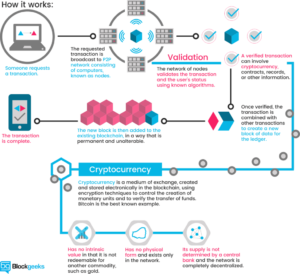This is part five of a five part series on disruptive technology. You can read Part 1 on IoT here and Part 2 on AI here. Part 3 on Big Data is here and Part 4 on Drones is here. Disruptive technology is technology that pushes the boundaries of an industry, dramatically changing how we live or how things are made or done. The term disruptive innovation comes from the book The Innovator’s Dilemma by Clayton Christensen (1997). Many, many people have written tons of examples that are old-school: hard-drives/floppy disks, monitors/flatscreens, and so on. This series is about new technologies (at least new in 2017/2018) that are disrupting the world today.
Block Chain and Cryptocurrency
When people say cryptocurrency, they usually mean Bitcoin and similar digital moneys. Block Chain, however, is the technology (along with cryptography) that powers the cryptocurrency movement.
So to understand cryptocurrency, you have to understand block chain… but… block chain can do so much more than cryptocurrency! Where to start?
Let’s start with Cryptocurrency because I think this article does a great job of summing up the idea:
“cryptocurrencies … [are] just limited entries in a database no one can change without fulfilling specific conditions.”
That’s it. It’s a database of who has what money. What really? Yes.. but… the article goes on to explain how it works quite well:
 SOURCE: https://blockgeeks.com/guides/what-is-cryptocurrency/
SOURCE: https://blockgeeks.com/guides/what-is-cryptocurrency/
In essence, there are three things happening here:
- Public/Private Key Encryption (to prove that you are the owner of the digital currency).
- Peer-to-Peer broadcasting of transactions. (so that everyone has a complete record of what money is where).
- Validation of the transactions. (so that a consensus is built and saved in an immutable way that the transaction was legitimate and completed).
- Bitcoin miners do these validations and earn some bitcoins (or whatever) for sharing their computer power to do it.
Okay, so what about block chain?
Simply put, a Block Chain, is the chain of all transactions that have ever happened (or deltas since a certain date/time). In other words, it is the database. What makes Block Chain a special kind of database are 3 things:
- Each new entry in the database is cryptographic-ally “chain”ed together with prior entries, preventing corruption of the database as well as forgeries.
- Many copies of the database (or it’s deltas) are kept stored on many different systems and kept in sync whenever something new gets added to the chain.
- *usually* the database itself is public, or at least available to all users and verifiers of the block chain.
This article does a pretty good job of explaining block chain… they compare it to a shared google document. Many people can edit the document at once and all changes are tracked and saved simultaneously. Each person editing the document can also see each other’s edits in real-time.

Why Business Care about Block Chain and Cryptocurrency
There are many reasons why businesses should are, and may get disrupted:
- Cryptocurrencies may take off and become just “currency”. This is already happening and many businesses will accept bitcoin (for example) to buy products and services.
- Cryptocurrency trading markets will make this more and more possible, as businesses can exchange bitcoins into locally useful currencies.
- Block Chain concepts can be applied to more then just money!
- A distributed trusted ledger can also be useful for lots of other things:
- Save costs by hosting the database in the peer-to-peer cloud!
- Increase security by preventing database modifications!
- Create new solutions to challenging problems using peer-to-peer concepts (distributed computing)
- A distributed trusted ledger can also be useful for lots of other things:
- What kinds of things are being put onto block chains?
- Health Records
- Exercise Statistics
- Gaming (both gambling and no-stakes records)
- Promises
- Computing Results – (distributed computing)
- Movies, Music, Media – all of it.
- Analytics/Raw Data
- this list is endless… ANYTHING that could be put into a database or ANY digital data can be stored in a block chain.

